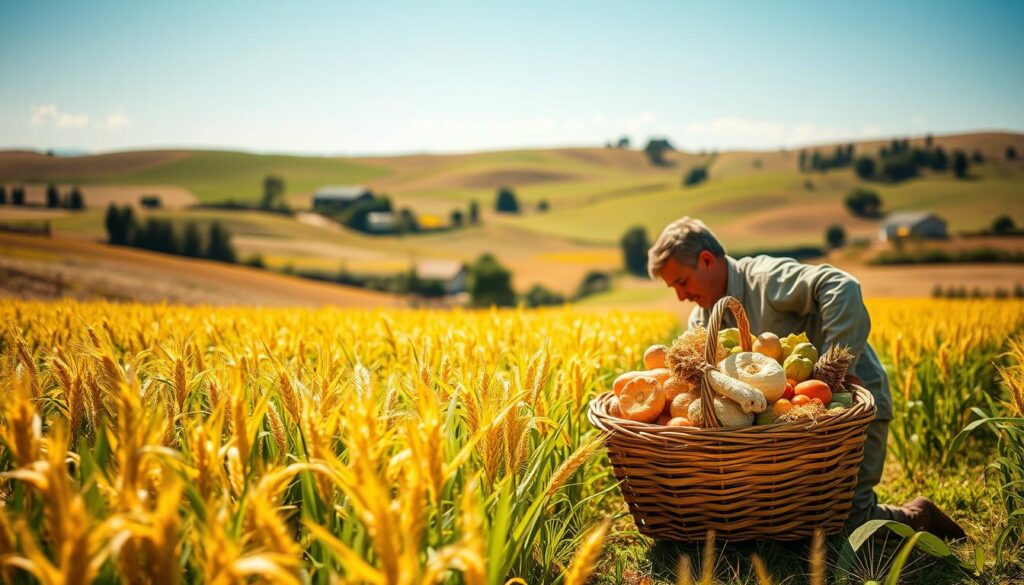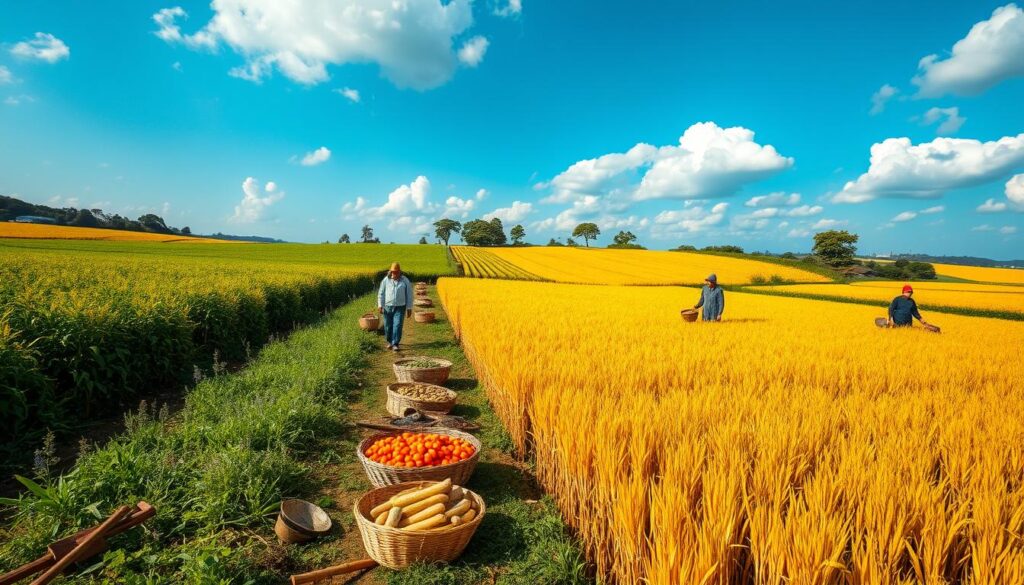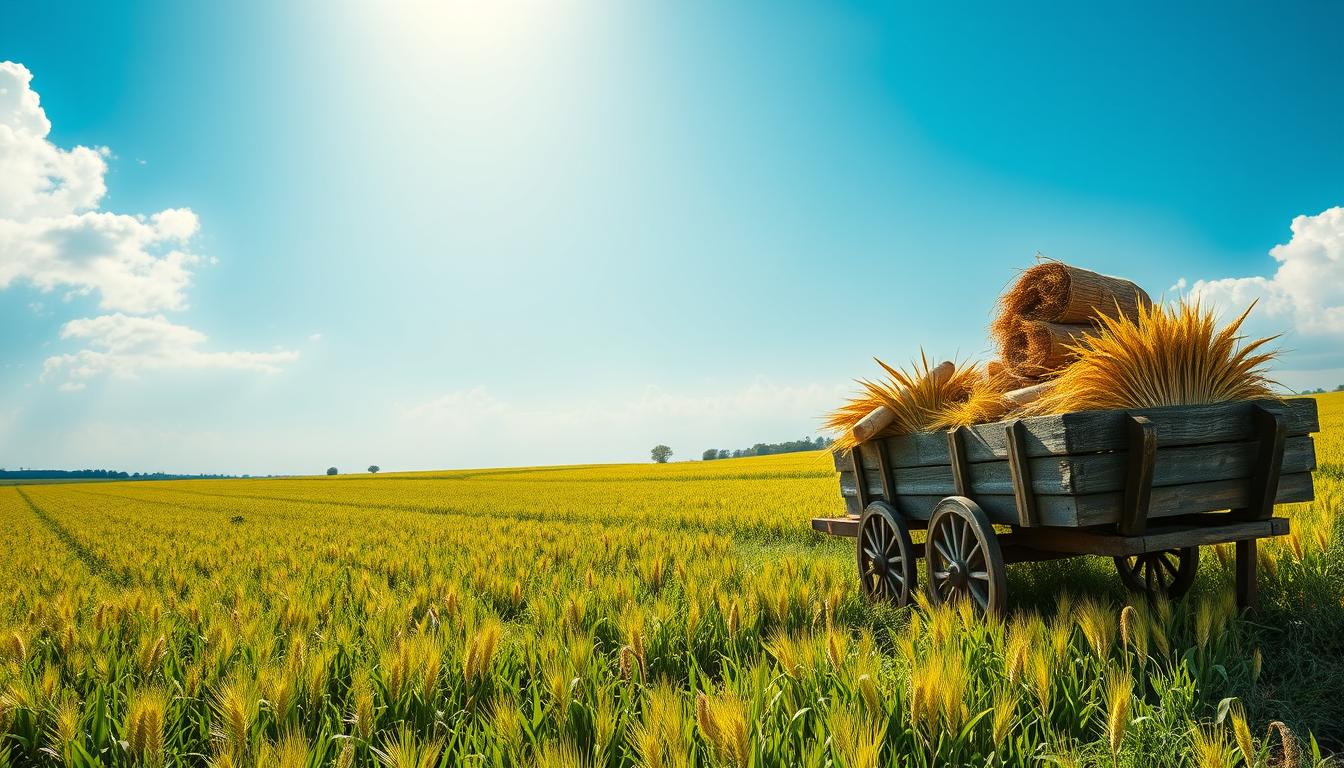Did you know zakat is required for crops like barley, wheat, grapes, and olives? The amount needed is either 5% or 10% of the crops. At Umar Khan Charity Organization, we see zakat as key to growing our community and helping those in need. Zakat on crops helps make our society more just and fair.
We want to help people understand and do their part in zakat. This way, we can all make our communities better. By learning about crop tithing, we can work towards a fairer world.
Key Takeaways
- Understanding zakat on crops is essential for fulfilling Islamic duties and promoting social justice.
- The agricultural nisab for zakat assessment can be either 5% or 10% of the crops.
- Zakat on crops, or agricultural alms, is obligatory on certain agricultural outputs, including barley, wheat, grapes, and olives.
- Crop tithing plays a significant role in promoting equality and supporting vulnerable populations.
- Umar Khan Charity Organization is dedicated to transforming lives through sustainable, faith-based humanitarian work, including initiatives related to zakat on crops.
- By working together, we can create a more just and equitable society through the implementation of zakat on crops and other forms of agricultural alms.
Understanding Zakat and Its Importance
Zakat is key for Muslims, a core part of Islam. It’s not just giving to charity; it’s a duty to help others and build community. Zakat is a big part of Islamic agriculture tax, helping with farmland charity and farming zakat.
The Quran says Zakat cleanses wealth and soul. It’s a big part of Islamic finance and helping others. We encourage readers to learn about Zakat to understand its role in Islam. Zakat brings spiritual growth, self-improvement, and love for others, believing it makes wealth better and shows obedience.
Zakat can be on wealth, livestock, or crops, each with its own rules. For example, the Zakat rate on irrigated land harvest is 5 percent, and on unirrigated land, it’s 10 percent. To learn more, visit Umar Khan Charity Organization and see how farming zakat and farmland charity work in Islamic agriculture tax.
By fulfilling Zakat, we help our communities and foster brotherhood and love. The Prophet Muhammad said wealth doesn’t decrease with charity, and Zakat benefits us now and in the afterlife.
What is Zakat?
Zakat is a vital act in Islam, a part of wealth given to those in need, as ordered by Allah, mentioned in the Quran.
The Role of Zakat in Islam
Zakat is about obeying Allah, seeking His pleasure, and helping others and society.
Types of Zakat
Zakat can be on many things like banknotes, stocks, and food, each with its own rules and how to pay.
| Type of Zakat | Rate | Payment Instructions |
|---|---|---|
| Zakat on wealth | 2.5% | Payable on the net value of wealth after deducting specified liabilities |
| Zakat on livestock | Varies | Payable on the number of animals, with specific ratios for different types of livestock |
| Zakat on crops | 5-10% | Payable on the gross or net value of harvest, depending on the type of land and irrigation |
The Concept of Agricultural Zakat
Understanding agricultural zakat is key for farmers and those in agriculture to meet their Islamic duties. It involves giving a part of the crop harvest donation as zakat. This helps the needy.
To figure out zakat on crops, we look at how they were watered. If watered by rain, 10% of the harvest is zakat. But if watered by machines or bought water, it’s 5%. For land using both, it’s 7.5%. Knowing this is important for zakat calculation for crops.
Definitions and Guidelines
The nisab for crops is five wasqs, or about 657 kilograms. Zakat is owed on rented land if it meets the nisab and a year has passed. Expenses are not subtracted before zakat is paid, most scholars agree.
Crops Subject to Zakat
Most scholars say almost all crops, except for fresh fruits and vegetables, are subject to Zakah. If different grains or fruits can be combined to meet the Nisab, zakat is paid for each type.

- Zakat on crops is required if the harvest is over 600 kilograms, loss or profit.
- If the harvest is at least five wasqs, or about 653 kilograms, zakat is 10% if watered by rain. It’s 5% if watered by machines or humans.
By following these guidelines, we can make sure our crop harvest donation helps those in need. This way, we fulfill our Islamic duties correctly.
Calculating Zakat on Crops
We aim to make zakat on crops easy for farmers and donors. The amount depends on the crop and how it’s watered. For example, corn watered by nature needs 10% of the crop for zakat. But if it’s watered artificially, only 5% is needed.
The nisaab, or minimum amount, is also key. For crops, this is about 653 kilograms. We’ll guide you through how to figure out zakat on crops. This way, it’s fair and just for everyone.
Here are some important points for calculating zakat on crops:
* The type of crop and how it’s watered change the zakat rate
* The nisaab is 653 kg for crops
* Zakat rates range from 5% to 10% based on the crop and water method
* Zakat for crops can help those in need through organizations
By following these guidelines, we can help our zakat make a difference. It supports local communities and faith-based humanitarian work.
| Crop Type | Irrigation Method | Zakat Rate |
|---|---|---|
| Corn | Natural | 10% |
| Corn | Artificial | 5% |
| Other Crops | Varying | 5-10% |
Eligibility for Agricultural Zakat
It’s important to know who must pay zakat on crops. As Muslims, we must give zakat on our land or crops that have enough to pay. This includes crops like wheat, barley, and dates, which are part of our Islamic duties.
To see if you must pay agricultural zakat, check if you own land or crops that meet the nisaab threshold. If you do, you must pay zakat. This is a key part of farming zakat and crop tithing. We need to think about the crop type, irrigation method, and land use when figuring out our zakat.
Some important things to remember about agricultural zakat include:
- The nisaab threshold, which is the minimum amount of produce that necessitates zakat
- The method of irrigation, which can affect the amount of zakat payable
- The type of crop, which can impact the eligibility for zakat
By understanding these points and fulfilling our zakat duties, we help our community and follow our Islamic values. 
| Crop | Method of Irrigation | Zakat Rate |
|---|---|---|
| Wheat | Rainwater | 10% |
| Barley | Machinery | 5% |
| Dates | Rainwater and Machinery | 7.5% |
Timing and Distribution of Zakat
We know how important it is to pay and distribute zakat on time. This is key in Islamic agriculture tax and farmland charity. Zakat on crops should be given out at harvest time.
This way, wealth reaches those who need it quickly. It follows Islamic charitable work principles. Zakat must go to the poor, needy, and others first. This helps fight poverty and brings communities closer together.
When to Pay Zakat on Crops
Zakat on crops is due when the harvest is ready. It must follow Islamic rules. Knowing the nisab, or minimum wealth for zakat, is critical. For crops, this is 653 kilograms. The zakat rate is 5% for irrigated and 10% for non-irrigated crops.
Best Practices for Distribution
We aim to make a difference with our farmland charity. Effective zakat distribution is key. This includes:
- Finding the right people to help, like the poor and needy
- Being open and responsible in how we give out zakat
- Helping local communities through Islamic agriculture tax and farmland charity
By following these steps, we can really help those in need. Our efforts in Islamic charitable work and farmland charity will make a big difference.
Impacts of Zakat on Local Communities
Zakat has a big impact on local communities, more than just giving money. It helps the poor by giving them economic support. This support reduces poverty and boosts the economy.
For example, farmers who use Zakat money for sustainable farming make almost double what regular farmers do. This shows how zakat can really help.
The good effects of zakat are many. It shows how powerful it can be for communities. Some of the main benefits are:
- Reduced poverty: Zakat helps the poor by giving them money.
- Economic growth: It supports sustainable farming and other jobs, helping the economy grow.
- Social stability: Zakat makes people feel they should help those who are less lucky.
Thinking about zakat’s effects on communities reminds us of the value of agricultural alms and crop harvest donation. They help grow the economy and make society more stable. By supporting sustainable farming and jobs, we can fight poverty and make society better for everyone.
Initiatives by Umar Khan Charity Organization
We at Umar Khan Charity Organization are dedicated to helping with farming zakat and supporting those in need. Our goal is to change lives through faith-based work. We aim to make a world where everyone has what they need to succeed.
We help with zakat calculation for crops and make sure donations help those who need it most. We value transparency and using resources wisely to make a big difference. Our main projects include:
- Food Aid and Zakat Distribution programs, which support over 5,000 families annually
- Educational Sponsorships and School Construction projects, which provide access to education for underserved communities
- Livelihood Aid and Skills Training programs, which empower individuals financially
We encourage readers to explore our work and how they can help. Together, we can build a better future for everyone.
Getting Involved with Zakat Initiatives
We encourage readers to join zakat initiatives. It’s a great way to help communities. By taking part in crop tithing and supporting Islamic agriculture tax projects, you can really help those in need.
Our mission is to believe in the power of working together. We offer chances for people to help with zakat initiatives. You can help in many ways, like giving money, volunteering, or spreading the word.
- Volunteering time and skills to support agricultural projects
- Donating to organizations that work towards sustainable agriculture and food security
- Spreading awareness about the importance of zakat and its impact on communities
Together, we can tackle big problems like food insecurity. It affects 1 in 9 people globally. We aim to improve agriculture and food security, reducing hunger and poverty.
We promise to be open and accountable. We make sure 100% of zakat donations go to refugee communities. They support projects like greenhouses and farming. Join us to fight for social justice and equality.
Conclusion: Your Role in Zakat and Charity
Zakat on crops is key in Islamic farming, showing the importance of helping others. It teaches us about fairness and working together. By giving zakat, we help our communities grow and thrive.
At Umar Khan Charity Organization, we see zakat as a way to change lives. We encourage everyone to join us. Together, we can build a fairer world for everyone. Farmland charity efforts, based on zakat, can really help communities and support lasting growth.
The Prophet’s words warn us about ignoring zakat. It affects our lives now and in the future. By giving, we clean our wealth and help those in need. Let’s follow the zakat spirit and work together for a better society.






